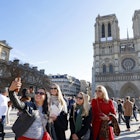
Dec 5, 2024 тЂ 10 min read

Nov 13, 2023 тЂ 4 min read

Centre Pompidou, which houses one of the important collections of modern art in Europe, is set to close for five years ТЉ Getty Images
Parisт cultural scene is always in flux, be it the closure of one museum or the opening (and re-opening) of another. Over the last few months, thereтs been a small shake-up in the French capital with the opening of a few new and unexpected cultural attractions that will appeal to a range of interests.
Photography lovers and hobbyists, for example, may be interested to learn about the opening of a free, floating art space on the Seine river devoted to modern photography, while a new math museum may intrigue the number-loving, science-minded visitor.
Meanwhile, one of the biggest cultural announcements this year was news that the Centre Pompidou, which houses one of the most important collections of modern art in Europe, is set to close between 2025 and 2030. But as the saying goes, where one door closes, another opens: the in the 14th arrondissement is working on a new project near the Louvre which is poised to become the largest private art gallery in the city when it opens in 2025.
In the meantime, hereтs a look at some of the newest cultural attractions that have enriched the city in recent months:

The home of one of Franceтs most influential and controversial singer-songwriters, Serge Gainsbourg, opened its doors to the public this fall more than 30 years after his death in 1991. Gainsbourg was perhaps best known for his sexually provocative, 1969 duet with Jane Birkin тJe T'Aime ... Moi Non Plus,т which was banned by the BBC and condemned by the Vatican. Preserved in its entirety т ashtrays still brim with old cigarette butts т offers fans and visitors an intimate look at the artistтs life through artworks, photographs, clothes and documents. Across the street, a museum holds an archive of manuscripts, photographs and rare and unpublished press interviews. Note that tickets are sold out until the rest of the year but that .
Tickets for museum and house tour тЌ25
If your Paris visit takes you to the southeast end of the city, perhaps to explore the village-like neighborhood of Butte aux Cailles, the Jardin des Plantes, or Chinatown, consider adding Parisтs newest floating art center to your itinerary. Anchored along the Seine, the opened this past summer as a space dedicated to contemporary photography across 935 sq meters (10,070 sq ft). The inaugural exhibition is British photographer Martin Parrтs interpretation of the expression тLifeтs a Beach.т After the exhibit, grab a drink at the bar and take in the riverside views of the city, or grab a bite at the restaurant. The integrated marina also offers 50-minute river cruises Wednesdays to Saturdays for groups of up to 12 people.
Boat rides are тЌ12 and the exhibits are free.
The spring opening of the added a sense of lighthearted whimsy to Parisтs cultural scene. Because as its name suggests, here whatтs down is up, and whatтs black is white. Spanning three floors and 1700 sq meters (18,300 sq ft), the immersive museum features 90 sensory experiences in which the laws of gravity donтt apply, and where the lines of reality are blurred by illusions and trickery. Visitors are challenged to pass through a spinning tunnel without losing their balance, and can swap facial features with friends without the use of smartphones or apps. Of the six existing Paradox Museums in the world (other locations include Miami, Stockholm, Oslo, Barcelona and Limassol, Cyprus), the Paris location is the biggest.
Tickets тЌ27 adults; тЌ22 under 18

The newest and arguably most high-profile cultural opening of the year is the or International City of French Language, which was inaugurated by French President Emmanuel Macron last month in front of an audience of 500 guests. Located in the town of Villers-CotterУЊts about 45-minutes by train northeast of Paris, the institution is housed in the restored ChУЂteau de Villers-CotterУЊts, where Francis I signed the ordinance that made French the official language of France in 1539. Francophiles will learn about the history, culture, evolution and impact of the French language over 1600 sq meters (17,200 sq ft) of exhibition space. French is the fifth most spoken language in the world.
Tickets тЌ9 adults; kids free
You could say that Franceтs first museum dedicated to mathematics is self-aware. Their tagline? тThe museum that wants you to like math.т Because if the notion of a math museum summons bad flashbacks of high school calculus, this museum, curators say, is for you. The aim at the (named after the French mathematician and scientist Henri PoincarУЉ) is to make math more accessible and to help visitors understand how mathematics can explain everyday phenomena, be it crowd movement at one of the cityтs busiest metro stations, to the math behind how soccer balls are made or how life expectancy is calculated. Spanning 900 sq meters (9700 sq ft), the exhibition uses virtual reality, games, videos and interactive features to show how math works in our daily lives. Spearheaded by a mathematician and former French deputy, the museum was also developed for a more prosaic reason: to inspire more interest in the subject among French students who have among the . The museum is recommended for kids 12 and older.
Tickets: тЌ10 adults; kids free


Dec 5, 2024 тЂ 10 min read

Dec 1, 2024 тЂ 14 min read



Nov 6, 2024 тЂ 7 min read

Oct 31, 2024 тЂ 11 min read

Oct 31, 2024 тЂ 5 min read

Oct 24, 2024 тЂ 13 min read
